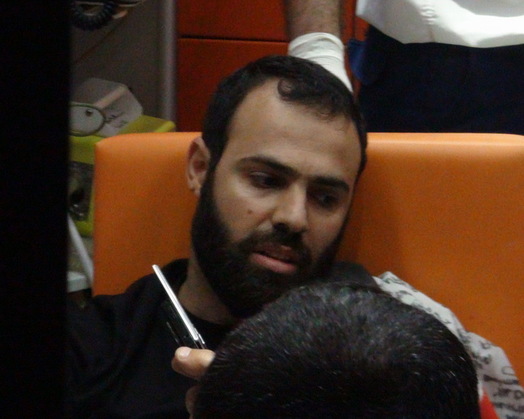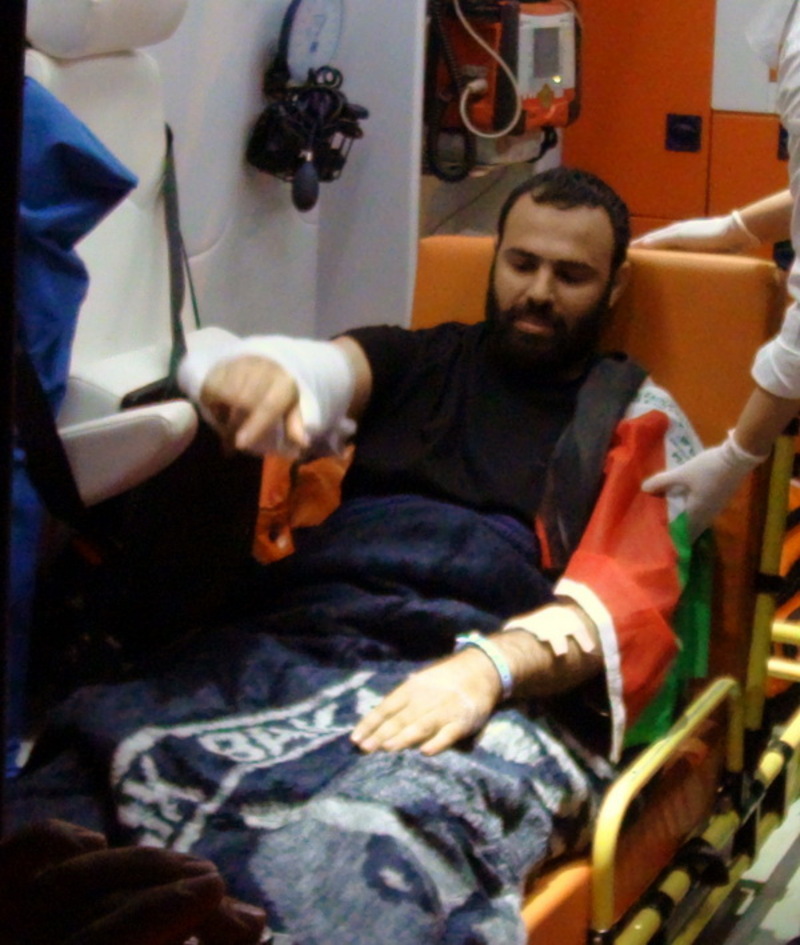
Mehmet Ali Zeybek, 29, had registered for the Mavi Marmara in the city of Diyarbakır. He is a pharmacist and married with one a child. He still lives in Diyarbakır. Zeybek was on the upper deck of the ship where Israeli commandos landed and witnessed the attack. He was shot nine times and subjected to other rights violations confirmed by the UN Fact-finding Mission Report. He personally witnessed the shooting and wounding of other activists on the Mavi Marmara. Zeybek was kept at Israeli hospitals for days, isolated from the rest of the world and was not even allowed to contact his family. His ordeal shows the humane aspect of Israel’s crime against humanity.
“It had been half an hour since the attack began. The soldiers were firing incessantly. Our friends were falling one after another. I saw soldiers coming through foredeck. Hüseyin Solmuş, who had gone downstairs for praying, came up again. The number of soldiers onboard had grown. They were probably boarding the ship from below as well. I walked towards Hüseyin when I noticed him. At that moment I saw Ali Haydar Bengi falling. Mehmet Yıldırım also fell next to him. They were lying on the floor side by side. I changed my direction from Hüseyin to Ali Haydar. I thought I would carry him downstairs if he had been wounded. Just then I felt I had been given shock from behind. My arms and legs suddenly stiffened. I did not realize what had happened. I was bleeding in several parts of my body. I later found out that I had been wounded in several places but I had not felt it in any way. I went towards Hüseyin in that condition. ‘What are you doing?!’ he asked. ‘I have been shot, I am going downstairs,’ I replied. ‘Let us help you,’ they offered. ‘No, you help other friends,’ I responded.
As I was walking downstairs I wanted to stay where I was. But just then I felt another shock. When I looked the other way I saw soldiers shooting at fallen friends as if shooting at animals. They were violently kicking with their boots the activists whom had been shot. One of the soldiers came up to Ali Haydar and fired at him, turned him and fired again. I crashed at the entrance of stairs leading downstairs at that moment. I probably had lost too much blood. My head was spinning. The soldiers came up to me. Blood was flowing through openness. I let myself through the openness. I reached for the railing but could not hold on to it. My right arm had been badly wounded and one of the main veins had burst. I fell to the floor as I could not hang on to the railing.

*
My clothes had all been ripped. My friends had covered my legs with sort of a blanket. As soon as the soldiers got hold of me, they ripped my underwear and took me through people naked. There were many respectable scholars, friends, acquaintances there. I had spent three days at sea and three days at Kepez Sports Hall in Antalya with those people.
*
I had joked with Fahri Yıldız and talked to Ali Haydar Bengi all day that day. Furkan Doğan came to me at midnight saying ‘The speech of Diyarbakır residents is cute. Could you talk to me for a while?’ I had known İbrahim Bilgen since the day he joined the foundation and I am the one who last talked to him. ‘You go downstairs brother,’ I had told him… I witnessed the martyrdom of them all. They had all been martyred…
*
I was made to lie on my back under the sun for long. They had thrust my passport into my hands. It fell off as I tried to get it. A soldier there threw my passport onto something like gurney up. Another soldier took the money inside my passport and threw it into the sea. I was left with no identification paper. And also completely naked. I was thirsty and that was probably why my vision was coming and going. I still had not lost consciousness despite heavy bleeding.
As I was waiting in this condition a person came and pulled me to the foredeck. I knew another friend had died there, but could not know who he was. I later found out he was brother Ali Haydar Bengi. Since there was no one else, it was probably him. They had covered him, so I could not see him. I was also made to wait there for a very long time. At one time, they brought a wounded friend and lay him next to me. They had covered him too and I could only see his body. A blonde, hefty soldier came over and handled wounded friend’s wound with a pincer resembling an adjustable spanner. The friend was naturally screaming at the top of his lung. He was obviously in great pain. They probably removed the bullet. I still do not know who that friend was. The same soldier removed the bullet in my right foot with the same method without applying narcosis. They were evidently rejoicing at our agony, screams. He was stooping over me to remove the bullet, but I controlled myself and did not scream. He removed the bullet, put it in a bag and left. I think they had used banned weapons and removed the bullets on the spot without using narcosis to leave behind no evidence. They did not check the other bullets in my body then. They only removed the one in my right foot. We were really thirsty and asked for water. A soldier came with a bottle of water and drank it. He washed his face with the rest and left.
*
It was my second day at the hospital. They were not giving us food, we were hooked to serum. I was asking for water, but they would not give me any. No food, no water or anything. They took me hurriedly at night. When I asked where they were taking me, they replied ‘a man called Doctor Clayn will operate on you.’ He was a plastic surgeon. I thought they were taking me to an operating theatre. They had meanwhile sent two of my friends in the room to Turkey. They moved me around for a while and took me to a room not the operating theatre. At one time, the door was opened half way. A group of people had gathered outside with banners in English and flowers. The soldiers chased them away quickly.
They changed my room again on the third day. They did not let us sleep at night. I was in such a condition that I was forgetting the count while praying. It did not know if it was the effect of narcosis or sleep deprivation. Whenever I said ‘Bring sand, I have to prepare for prayers. Let me talk on the phone. Call the embassy,’ they would say ‘No!’
*
They hurried me to an ambulance and tied my arms. I was put into the ambulance at 05.00 am and moved around the streets until 11.00 am. I was banging towards sides of the vehicle as it was moving. Some vehicles were closely following the ambulance. Mossad agents were also following us in a large car.
*
When I arrived in Ankara everybody took good care of me. There is something I really want to tell. My doctor brother came to me and said ‘Talk to your wife.’ I phoned her and she asked about my health and condition. I also asked how she was. She said ‘Talk a little to your daughter too.’ My daughter is only two-three years old. ‘My daughter who?’ I replied. ‘Don’t you remember your daughter?’ she responded. ‘No. Do I have a daughter?’ I could remember I have a wife, but not my daughter. I had gone through such a trauma that I could not even remember my daughter. My brother hung up the phone. ‘What daughter, Nurettin?’ I asked him. ‘Don’t you really remember your daughter?’ he asked back. He was showing me her photographs, but I still could not recollect anything. And I did not recollect during the three days I spent in Ankara. Only when I went to Diyarbakır and saw her was I able to remember that I really have a daughter.”
(You can read more about the ordeal of Memhmet Ali Zeybek and other flotilla participants in Freedom Flotilla through Language of Global Conscience-Interviews with Passengers published by IHH Book: http://www.ihh.org.tr/mavi-marmara-yayin-dunyasina-da-yelken-acti/en)